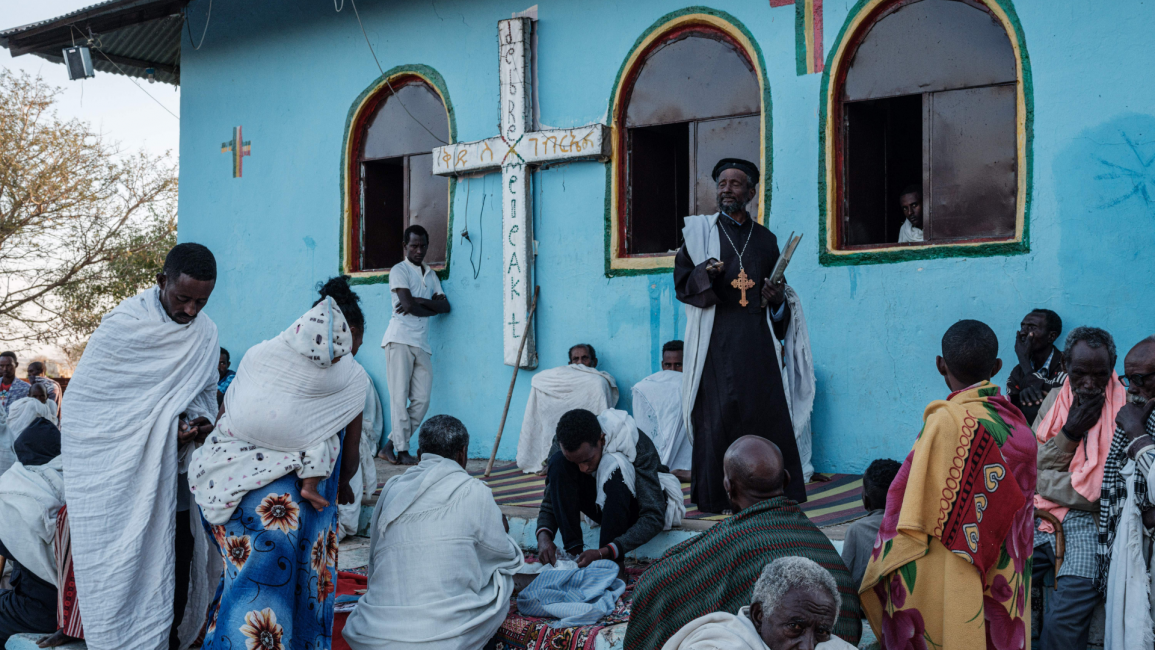Prayers for peace at Ethiopian 'refugee church' in Sudan
She is among some 400 Orthodox Christian believers attending the biggest mass at Jibreel (Gabriel) church since it reopened just over a week ago to refugees at Um Raquba camp near the border with Ethiopia, where fighting broke out in the northern Tigray region in November.
She and other prayer-goers weep silently as the priest leads a solemn litany for peace and for the right to return home.
"I keep praying day and night so that peace returns to our country, so that we can all go back... and live in peace and harmony," the priest, Abba Gabrielmaskal Admasu, tells AFP after the mass.
First famine, now war
Admasu explains that this is not the first time the church has held mass for refugees, and that it was built in 1979 by Ethiopian migrants.
Among those attending the latest mass are some who remember finding refuge in Um Raquba from the mid-1980s Ethiopian famine that killed hundreds of thousands of people - one of the worst humanitarian catastrophes of the 20th century.
In the year 2000, with most Ethiopian refugees having returned to their homeland, the camp and the church closed down.
Then, just over a month ago, Ethiopian Prime Minister Abiy Ahmed launched military operations in Tigray, saying they targeted the leaders of its ruling party, the Tigray People's Liberation Front (TPLF).
Twitter Post
|
Since then, more than 48,000 Ethiopians have sought refuge in a string of camps dotting the eastern Sudanese border area, including Um Raquba, according to the United Nations refugee agency.
With over 95 percent of Tigrayan Ethiopians hailing from the Orthodox Christian faith, the priest, Admasu, decided to reopen the Jibreel church's doors.
"Nobody likes to stay in a foreign country," he says, because being a refugee means "you don't have your freedom... and you have no right to move freely because you are under protection".
"What is very important for us now is peace, because we have everything in our country. But now, we lost everything, including our beautiful culture," he adds.
Moment of solace
Many of the refugees attending the Sunday mass had fled their homes in Tigray with nothing but the clothes on their backs.
Even so, they appear to have made efforts to clean up for the prayer, a rare moment of solace, dignity and togetherness at an otherwise desperate time.
The mass takes place outside under the blazing hot sun, beneath a wooden cross perched at the top of the church building.
"Without the church, there is no life, for us the church is very important," says Gitta Suheili, among the thousands of Ethiopians who survived displacement in the 1980s and who has had to return to Sudan as a refugee in recent weeks.
Read also: UN pleads with Ethiopia for Tigray refugee camp access
Another survivor of repeat displacement is Meresa Raye, an elderly woman wearing a green scarf over her shoulders.
"Thirty years ago I was here, and then I went back to my country. But now, because of the conflict, I am here again in Sudan, which makes me so sad," she says. "When I left this church, I never expected I would have to return."
Agencies contributed to this report.
Follow us on Facebook, Twitter and Instagram to stay connected



